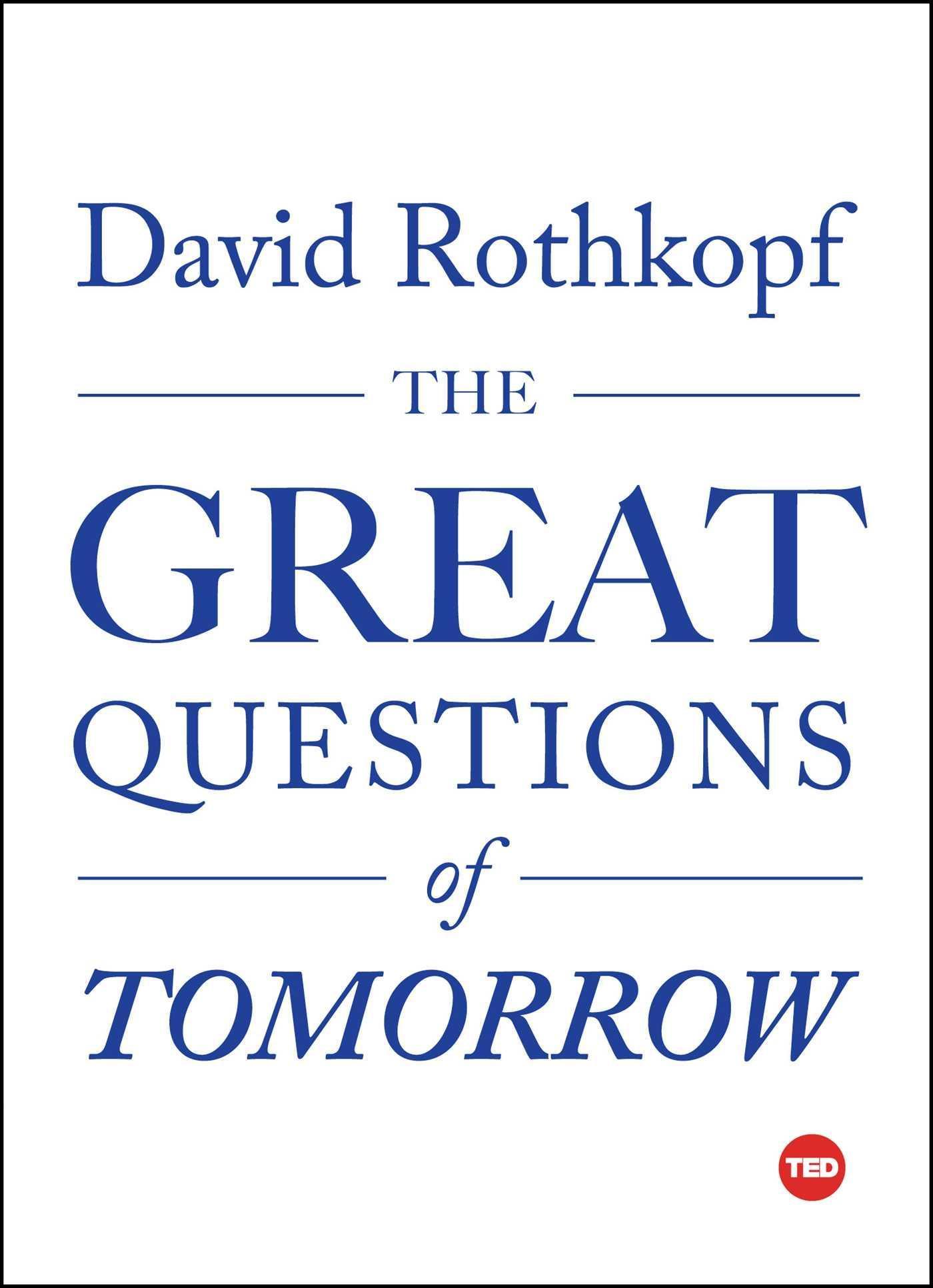The great questions of tomorrow
William Armstrong - william.armstrong@hdn.com.tr

French National Front presidential candidate Marine Le Pen attends a campaign rally in Villepinte, near Paris, on May 1, 2017. REUTERS photo
‘The Great Questions of Tomorrow’ by David Rothkopf (TED Books/Simon & Schuster, 128 pages, $8)The Italian Marxist Antonio Gramsci wrote from prison at the beginning of the 20th century: “The crisis consists precisely in the fact that the old is dying and the new cannot be born. In this interregnum a great variety of morbid symptoms appear.” Today, great technological, demographic, and natural changes seem to have us on the verge of an epochal watershed. But looking at the morbid symptoms of the geopolitical landscape does not inspire confidence that the world can weather these shifts without greater turmoil.
 In “The Great Questions of Tomorrow,” Foreign Policy magazine CEO David Rothkopf considers what he calls today’s “great threshold moment in history.” The social contract is being radically transformed, prompting life-redefining changes as daunting as they are promising. Digital disruptions, scientific and technological advances are having cascading unintended consequences. Change is coming whether we like it or not. “The crashing sound you hear is the result of obsolete systems running headlong into cold, hard realities that could have – and should have – been anticipated,” Rothkopf writes.
In “The Great Questions of Tomorrow,” Foreign Policy magazine CEO David Rothkopf considers what he calls today’s “great threshold moment in history.” The social contract is being radically transformed, prompting life-redefining changes as daunting as they are promising. Digital disruptions, scientific and technological advances are having cascading unintended consequences. Change is coming whether we like it or not. “The crashing sound you hear is the result of obsolete systems running headlong into cold, hard realities that could have – and should have – been anticipated,” Rothkopf writes.
Rather than providing answers, he says he simply aims to pose the right questions. Abraham Lincoln once said: “Give me six hours to chop down a tree and I will spend the first four sharpening the axe.” In Rothkopf’s hands, this principle often leads to pages full of little more than a series of questions: “Do we still need government? Should governments still be defined by geography, as they were before? Should government services remain as they were before?” He says we must recognize that much of what we take for granted will soon be eclipsed: “Jobs, money, economic theories, the way governments interact with the economy, how societies grow, and how they take care of people.”
The CEO of Foreign Policy meditating in a TED-sponsored soundbite-filled book may sound painful. But it is not as bad as it looks. The TED-ness of the book is mercifully limited: The format of posing questions rather than proposing solutions is actually the opposite of the typical TED talk, where a confident and successful person stands up to declare things for 18 minutes, with zero interaction and zero questioning.
Rothkopf notes the irony that throughout history the good has often been unleashed by the bad, and big changes come from small or unexpected developments. Amusingly, he compares today’s world to the situation in Europe after the Black Death in the 14th century. “In the wake of the human losses of the Black Plague, labor became more valued, and a middle class began to emerge,” he writes. “Trade flows, which may well have brought the plague to Europe from Asia, led to the exchange of new ideas and materials, to economic and intellectual growth. The nature of work and how we thought of economics began to change.” The Renaissance in Italy was one of the results.
Rothkopf does not say it, but his comparison effectively makes Donald Trump today’s symptom of the bubonic plague: A puss-filled wart. The book is certainly pessimistic about current institutions being up to the task of dealing with the most pressing issues. “New rules will need to be written,” Rothkopf writes. “Global regulation of the Internet, of financial transactions in cyberspace, and of increasingly global monetary policies shaped by the shifting modalities of e-money, as well as how we regulate and value work in a world in which human labor will be seen in a much different light.”
Most of the people in power do not understand the changes that are afoot and do not have the context, insight, and vocabulary to frame or answer the questions they should be asking. “You have the wrong people dealing with the wrong problems at the wrong time in a system that is designed to discourage them from doing any different,” Rothkopf writes. The rapid advance of machine learning, AI, VR and automation is perhaps the defining issue of our time, but political debate in any country barely touches on it. “Many of those in positions of power and their supporters are so actively trying to cling to the past we can almost hear their fingernails clawing at the earth as they try to avoid accepting the inevitable and momentous changes to come,” suggests Rothkopf. Without intervention, Lemmings simply drop off the edge of the cliff.
But in the longer term Rothkopf is optimistic. “Thanks to human ingenuity, most of the changes history has brought, large or small, whether they seemed catastrophic in the moment or not, have ushered in progress in its many forms and led us to the better world in which we live today,” he writes. He is not wrong. Turn away from gloomy media headlines and we really are in a world in which people live longer, are better educated, are healthier, have access to more opportunities, and are wealthier than any prior generation in history. It is not fashionable to make that point, but that doesn’t make it wrong.
Still, if history is any guide, progress does not preclude terrible cataclysms from taking place. Great changes are often accompanied by great, often violent, upheaval.
* Follow the Turkey Book Talk podcast via Twitter, iTunes, Stitcher, Podbean, Acast, or Facebook.
 In “The Great Questions of Tomorrow,” Foreign Policy magazine CEO David Rothkopf considers what he calls today’s “great threshold moment in history.” The social contract is being radically transformed, prompting life-redefining changes as daunting as they are promising. Digital disruptions, scientific and technological advances are having cascading unintended consequences. Change is coming whether we like it or not. “The crashing sound you hear is the result of obsolete systems running headlong into cold, hard realities that could have – and should have – been anticipated,” Rothkopf writes.
In “The Great Questions of Tomorrow,” Foreign Policy magazine CEO David Rothkopf considers what he calls today’s “great threshold moment in history.” The social contract is being radically transformed, prompting life-redefining changes as daunting as they are promising. Digital disruptions, scientific and technological advances are having cascading unintended consequences. Change is coming whether we like it or not. “The crashing sound you hear is the result of obsolete systems running headlong into cold, hard realities that could have – and should have – been anticipated,” Rothkopf writes. Rather than providing answers, he says he simply aims to pose the right questions. Abraham Lincoln once said: “Give me six hours to chop down a tree and I will spend the first four sharpening the axe.” In Rothkopf’s hands, this principle often leads to pages full of little more than a series of questions: “Do we still need government? Should governments still be defined by geography, as they were before? Should government services remain as they were before?” He says we must recognize that much of what we take for granted will soon be eclipsed: “Jobs, money, economic theories, the way governments interact with the economy, how societies grow, and how they take care of people.”
The CEO of Foreign Policy meditating in a TED-sponsored soundbite-filled book may sound painful. But it is not as bad as it looks. The TED-ness of the book is mercifully limited: The format of posing questions rather than proposing solutions is actually the opposite of the typical TED talk, where a confident and successful person stands up to declare things for 18 minutes, with zero interaction and zero questioning.
Rothkopf notes the irony that throughout history the good has often been unleashed by the bad, and big changes come from small or unexpected developments. Amusingly, he compares today’s world to the situation in Europe after the Black Death in the 14th century. “In the wake of the human losses of the Black Plague, labor became more valued, and a middle class began to emerge,” he writes. “Trade flows, which may well have brought the plague to Europe from Asia, led to the exchange of new ideas and materials, to economic and intellectual growth. The nature of work and how we thought of economics began to change.” The Renaissance in Italy was one of the results.
Rothkopf does not say it, but his comparison effectively makes Donald Trump today’s symptom of the bubonic plague: A puss-filled wart. The book is certainly pessimistic about current institutions being up to the task of dealing with the most pressing issues. “New rules will need to be written,” Rothkopf writes. “Global regulation of the Internet, of financial transactions in cyberspace, and of increasingly global monetary policies shaped by the shifting modalities of e-money, as well as how we regulate and value work in a world in which human labor will be seen in a much different light.”
Most of the people in power do not understand the changes that are afoot and do not have the context, insight, and vocabulary to frame or answer the questions they should be asking. “You have the wrong people dealing with the wrong problems at the wrong time in a system that is designed to discourage them from doing any different,” Rothkopf writes. The rapid advance of machine learning, AI, VR and automation is perhaps the defining issue of our time, but political debate in any country barely touches on it. “Many of those in positions of power and their supporters are so actively trying to cling to the past we can almost hear their fingernails clawing at the earth as they try to avoid accepting the inevitable and momentous changes to come,” suggests Rothkopf. Without intervention, Lemmings simply drop off the edge of the cliff.
But in the longer term Rothkopf is optimistic. “Thanks to human ingenuity, most of the changes history has brought, large or small, whether they seemed catastrophic in the moment or not, have ushered in progress in its many forms and led us to the better world in which we live today,” he writes. He is not wrong. Turn away from gloomy media headlines and we really are in a world in which people live longer, are better educated, are healthier, have access to more opportunities, and are wealthier than any prior generation in history. It is not fashionable to make that point, but that doesn’t make it wrong.
Still, if history is any guide, progress does not preclude terrible cataclysms from taking place. Great changes are often accompanied by great, often violent, upheaval.
* Follow the Turkey Book Talk podcast via Twitter, iTunes, Stitcher, Podbean, Acast, or Facebook.










